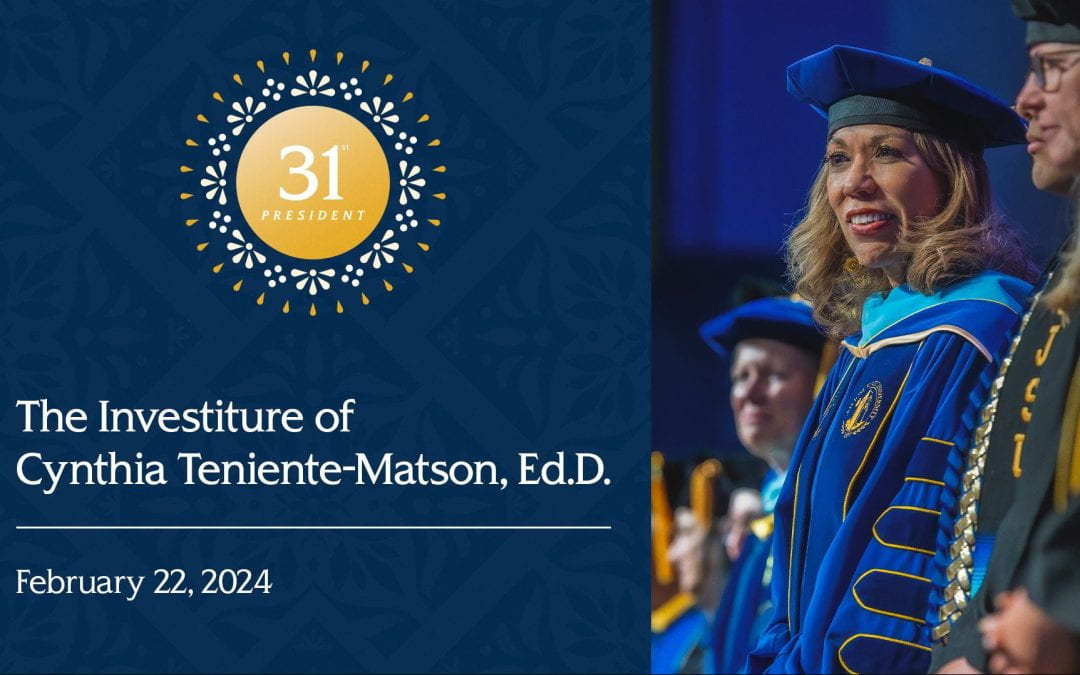Leading the Challenge: Master of Biotechnology Students Take Big Win at SVIC
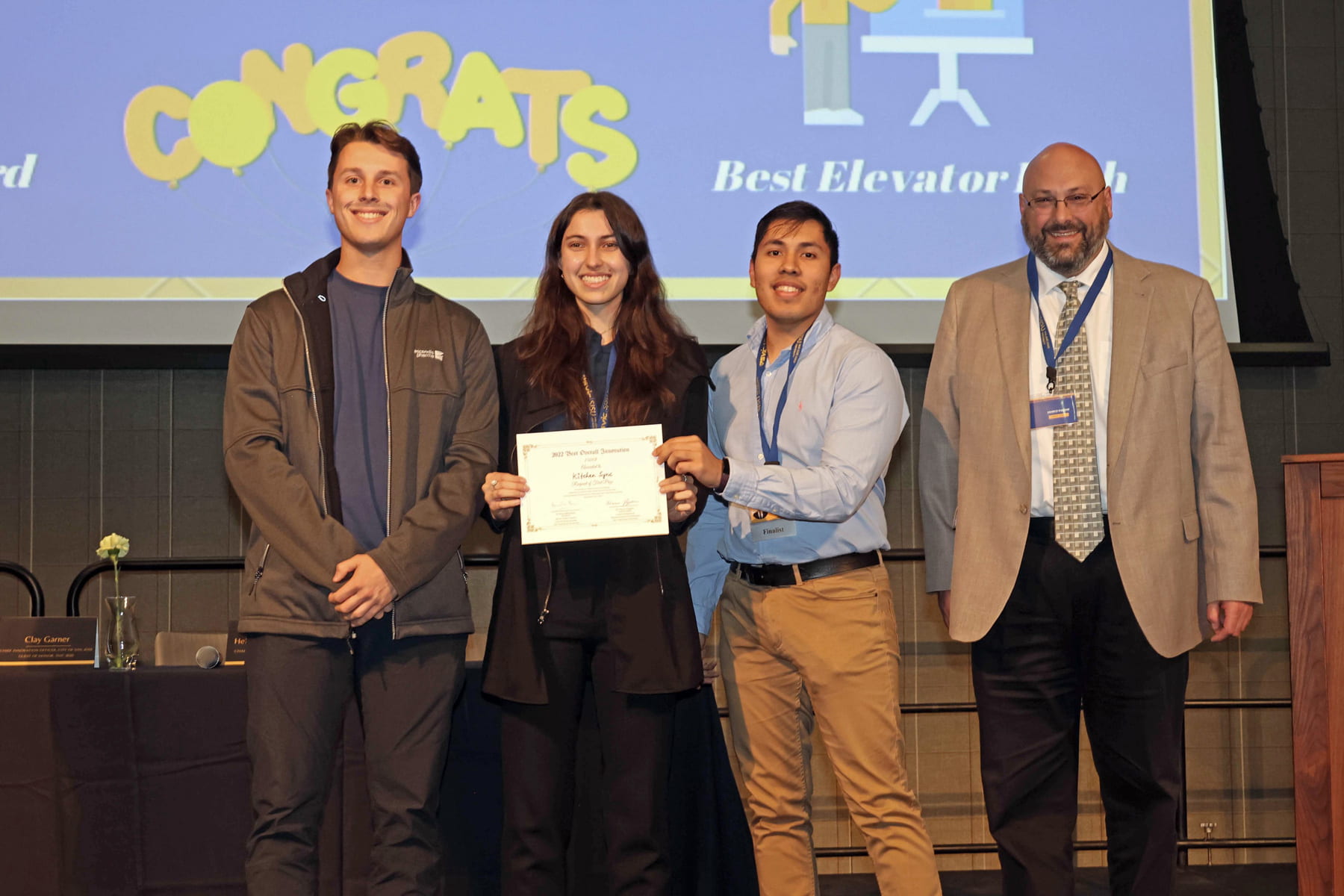
Best Overall Innovation Award winners (L-R: Nicolas Costa, Alexandra Piliotis and Nestor Rodriguez) with Lucas College and Graduate School of Business Interim Dean Marco Pagani on stage at the 2022 Silicon Valley Innovation Challenge.
This practical experience translates especially well for participating in the SVIC at the beginning of their second year in the program, in which they pitch the entrepreneurial ideas they are working on for their startups at the competition.
- Best Overall Innovation Award – Kitchen Sync: Alexandra Piliotis, ’23 MBT; Emilie Claire Schneider, ’23 MBT; Kaleana Plares, ’21 Biology, ’23 MBT; Nestor Rodriguez, ’23 MBT; and Nicolas Costa, ’23 MBT
- Best Technological Innovation Award (tied for first) – Solumi: Ramtej Pinisetty, ’23 MBT; Juan Martinez Mejia, ’23 MBT; Sharon Chang, ’23 MBT; and Lorene Lee, ’23 MBT
- Peoples’ Choice Award – NaBi: Maleeha Burney, ’23 MBT; Linda Keomanee, ’23 MBT; Jade Huynh, ’23 MBT; Naeun Park, ’23 MBT; and Quyen Thach, ’23 MBT
A fourth team from the second-year MBT class, Me^U, also competed in the finals. They worked on a platform that allows women to track disease and wellness markers at home.
A full list of 2022 SVIC winners can be found here.
This was also the first time the SVIC finals were held in person since the COVID-19 pandemic. Submissions included technological and social networking platforms, sustainable innovations and healthcare solutions.
The competition consisted of two rounds; 30 judges evaluated the first via an online platform, and 27 judges attended the final showcase at the Diaz Compean Student Union on Nov. 29. Among those judging this year were current and former SJSU faculty from across colleges, sustainability experts and technology professionals from Silicon Valley companies, including Intel and Cisco.
Silicon Valley Innovation Challenge Program Director, Sarika Pruthi, who is also associate professor for the School of Global Innovation and Leadership within the Lucas College and Graduate School of Business, said it was great to see participation from seven of our colleges, including Science, Social Sciences, Humanities and the Arts, College of Professional and Global Education, Business, Engineering and Health and Human Sciences.
There was even an interdisciplinary team, StoHunX, whose members are a part of the newly launched HonorsX program and from the colleges of Business, Health and Human Sciences and Engineering. The team won the Best Social & Sustainable Innovation award for their electronic package and data collection software system for food-waste management.
“Some of the finalists also returned to compete at this year’s challenge after developing their innovations from last year,” said Pruthi. “This shows that our students can learn from the judges’ feedback and feel inspired to advance their innovations to the next level, which is consistent with the mission of the SVIC.
“It is impressive that three of the winning teams [this year] come from the College of Science,” she added. “All three innovations captured the judges’ attention right from the beginning.”
Kitchen Sync: Get in balance with your body
Team members: Alexandra Piliotis, ’23 MBT; Emilie Claire Schneider, ’23 MBT; Kaleana Plares, ’21 Biology, ’23 MBT; Nestor Rodriguez, ’23 MBT; and Nicolas Costa, ’23 MBT
Team Kitchen Sync recognized the average person’s propensity to put their own health on the back burner when, in reality, a busy lifestyle and the stress we face often throws our bodies — and our hormones — completely out of balance. They showcased their idea for a convenient, at-home test that provides live data of hormone levels. Customers receive real-time results to help monitor their hormones as well as personalized lifestyle and nutrition tips, so they can be more in tune with their body’s needs on their schedule.
“Current hormone-tracking products focus heavily on fertility, leaving much to be desired for individuals looking to regulate additional aspects of their hormones,” said Emilie Claire Schneider. “We wanted to create a product and brand that prioritized an individual’s overall health and wellness.
“We came up with an idea that provided a more inclusive, accessible, and informational product to help improve the health and well-being of people who menstruate or are in menopause,” said Alexandra Piliotis.
“People born biologically female have a 28-day cycle in which various hormones fluctuate on a daily-to-weekly basis, and these hormones play very big roles in how we feel mentally, emotionally and physically. Yet, many people are never taught what those hormones are or how they affect us,” said Kaleana Plares.
Plares had her own experience with a hormone imbalance at a young age and struggled to find answers for years before she learned how to best address the issue with diet and exercise. That experience helped inform her interest in this topic and project.
The team saw the need for more awareness and education on this issue, which helped them have a clear vision for their product from the beginning. The product name Kitchen Sync is a play on words to describe the way they hoped the product would help people become more “in sync” with their bodies through the foods that they ate.
“It means a lot that we won the top award because it shows people recognize the need for an improved health and wellness industry for those who menstruate, and that current hormone and menstrual cycle education is lacking,” Plares added.
“The MBT program has been very successful with their projects in the past and it is very rewarding to continue that tradition,” added Piliotis. “It truly reinforces that hard work and dedication to your passions pays off.”
Both Schnieder and Plares currently work in the biotech industry. Schneider is hoping to shift her role from research to business and commercialization.
“The MBT program has prepared me to be able to utilize my biology background and experience in a cross-functional role within the biotech industry,” she said.
Solumi: Powered by diatoms
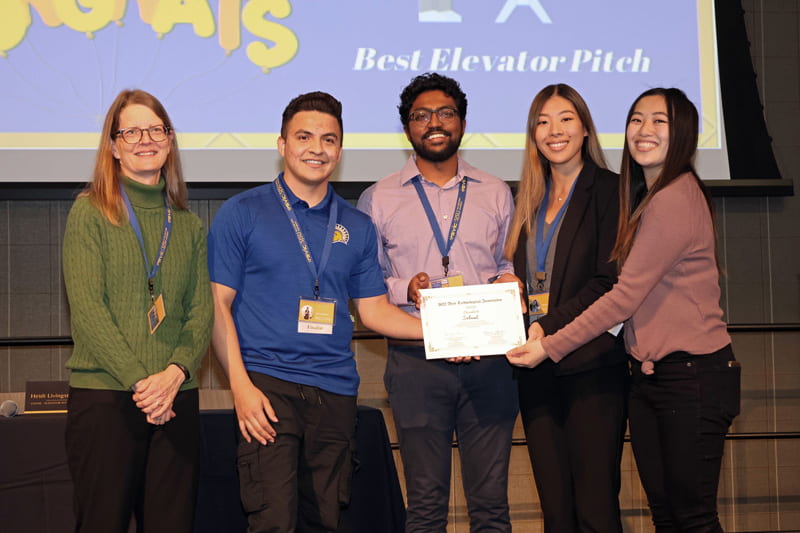
Don Beall Dean of Charles W. Davidson College of Engineering Sheryl Ehrman with team Solumi at the SVIC.
Team members (L-R in photo): Juan Martinez Mejia, ’23 MBT; Ramtej Pinisetty,’23 MBT; Sharon Chang, ’23 MBT; and Lorene Lee, ’23 MBT
The Solumi team presented an idea for a product that increases the efficiency of solar panels by up to 40% and reduces the overall cost of producing the same energy as a conventional solar panel. The Solumi Patch’s technology uses ground up silica from diatoms, a type of phytoplankton or microalgae, to capture light even on cloudy days, thereby increasing solar panels’ energy absorption.
Ramtej Pinisetty said he felt like the team’s knowledge in biology lent itself well to inspiring an innovation that creatively addressed one aspect of current societal concerns of climate change and energy. “While this is only a concept, we had several brainstorming sessions of how exactly the product would look,” he explained. “It was a collaborative effort.”
For Pinisetty, the interdisciplinary nature of the MBT program allowed him the opportunity to join the Executive MBA consortium on a trip to Cape Town, South Africa, to visit Stellenbosch University. There, he expanded his intercultural competence and learned about the agriculture industry from leaders and peers.
Nabi: Natural, biodegradable and flushable
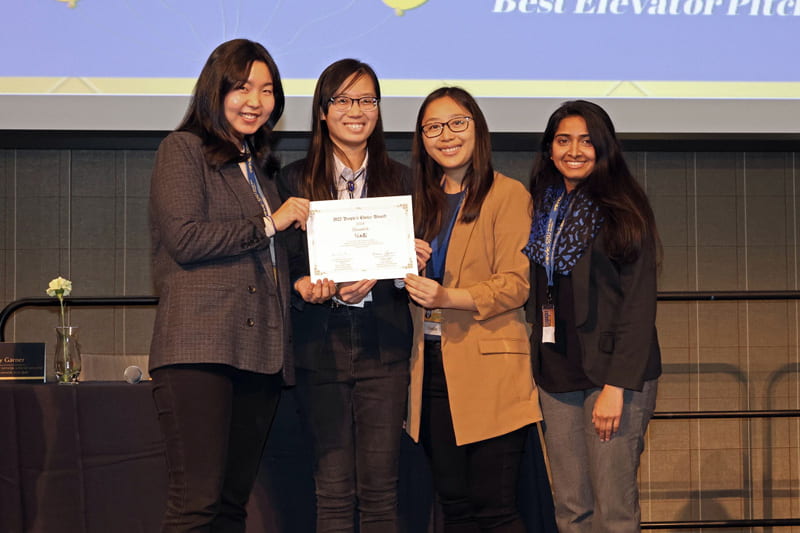
Team NaBi at the Silicon Valley Innovation Challenge.
Team members: (L-R in photo) Naeun Park, ’23 MBT; Quyen Thach, ’23 MBT; Linda Keomanee, ’23 MBT; and Maleeha Burney, ’23 MBT; (not featured) Jade Huynh, ’23 MBT.
Team NaBi wanted to address the environmental impact of sanitary pads, which are made almost entirely of plastic and take hundreds of years to break down in landfills. Their product, which translates to butterfly in Korean, is a biodegradable, flushable pad made of plant fibers from pineapple leaves, a polymer made up of corn husk and a naturally abundant, plant-based adhesive composed of bark gum, or dextrin.
“As women, we all deal with the monthly menstruation cycle and found that there is so much waste produced annually that is harming our environment,” said Burney. “Although there are several biodegradable products out there, we wanted to create an alternative plant-based solution that is flushable to completely eliminate waste. The U.S. market currently does not have flushable pads available, and we want to be the first to bring this product to life — hence NaBi.”
She said it took a lot of time to research the market, determine financial needs and create a timeline to produce and promote the product. “We all have more of a science background, so stepping into the business side of things took some effort, but overall we all learned a lot about how we work together as a team and what each individual can bring to the table.”
Winning the Peoples’ Choice award helped them feel accomplished knowing that people like the environmentally friendly alternative to traditional sanitary pads, which they hope to move forward with producing.
“Team NaBi are all hard-working individuals who currently work full-time in the biotech industry,” added Burney. “We hope to continue growing in our careers in various departments. On the other hand, we would love to make our product a reality, so it’s just the beginning for NaBi!”
Business and biotech
Though the Master of Biotechnology program is not new to SJSU, the concepts it covers are cutting-edge, blending advanced laboratory science with MBA-level business courses from the College of Business. Since many of the world’s top biotechnology companies are in relatively close proximity to San José State and Silicon Valley, which itself is known as a global hub of innovation, the program is a natural fit for SJSU’s growing portfolio of professionally and technologically focused degrees.
According to Sabine Rech, director of the MBT program, “Instead of a thesis the students are asked to come up with a business plan for a startup company. They work on that as a team during the second year of the program, applying all that they learned during the first year which includes advanced scientific techniques as well as business, including marketing, finance and intellectual property knowledge.”
While this is the first time three teams from the MBT cohort have taken home awards in the same competition, Rech said the pattern of success in the SVIC by MBT students has increased the confidence of everyone in the program. In 2021, a team of MBT students took home the Best Overall Innovation and Peoples’ Choice awards. Additionally, in 2019 teams of MBT students won first and third place in the Best Overall Innovation category.
“Some of the students come to the program with business ideas, and the SVIC gives them an opportunity to explore them and network with a wide variety of professionals,” she added. “The success of the students shows that the program is effective in reaching its goals and gives the students a variety of options to pursue for their careers.”
Longtime lecturer Mark Schwartz teaches courses for the business side of the biotechnology program; the first of which prepares them to participate in the SVIC. As a former biotechnology CEO, he shares his deep industry knowledge to the students and incorporates discussions in every class to get them thinking critically about the fundamentals of starting a business.
This year, he was incredibly impressed by the MBT cohort. “They all got it,” he said. “They all seem to understand the basics, the elements, the critical points, how to roll it out, how to frame it, what the world would be looking for, where there is an investor, a board member, etc.”
“Our MBT program professors guided us through all aspects of the process of conceptualizing a biotechnology company and product,” said Schneider. “The coursework prepared us well for the SVIC elevator pitch and poster presentation, as we knew our business inside and out!”
“As someone who did their undergraduate and now graduate studies at SJSU, the most memorable thing about SJSU is the desire for progress,” added Plares. “I also think SJSU embodies the innovative spirit of Silicon Valley, and the SVIC really highlighted that for me.”
Related Stories
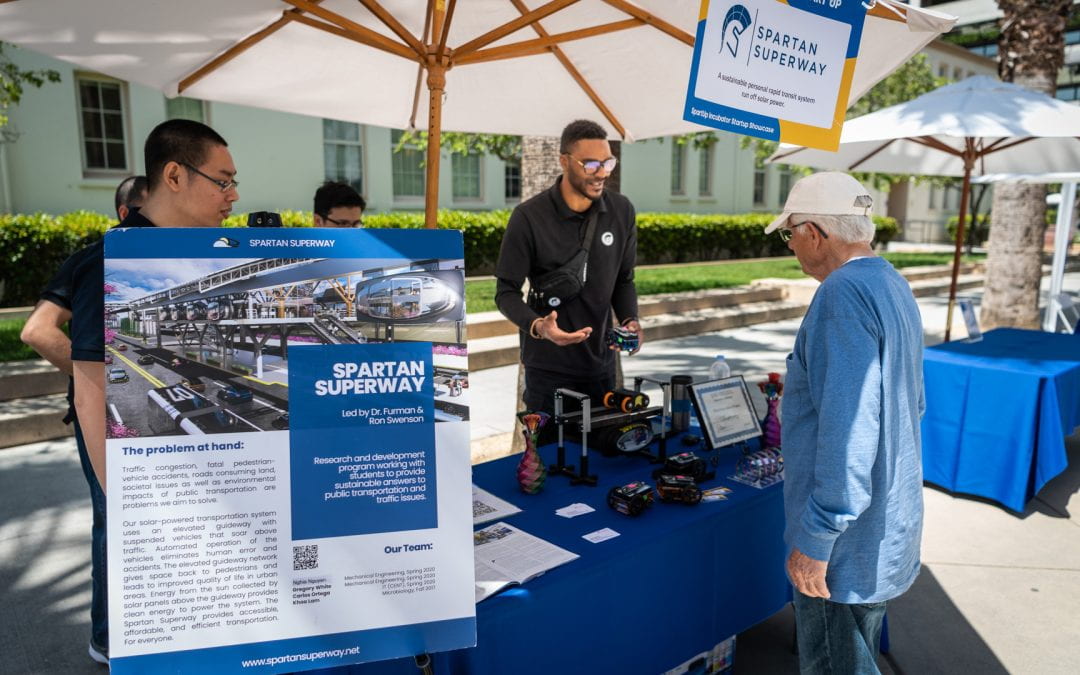
Second Annual SJSU Research Week to Celebrate and Highlight Public-Impact Research
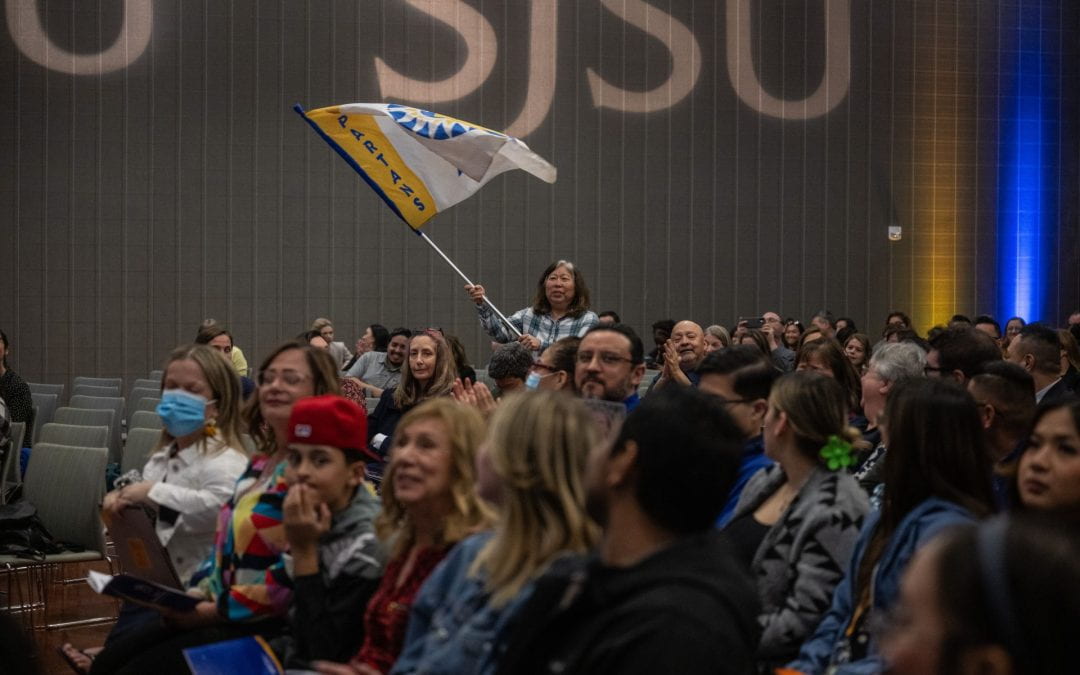
San José State Recognizes Outstanding 2023-2024 Staff and Faculty at Award Ceremony
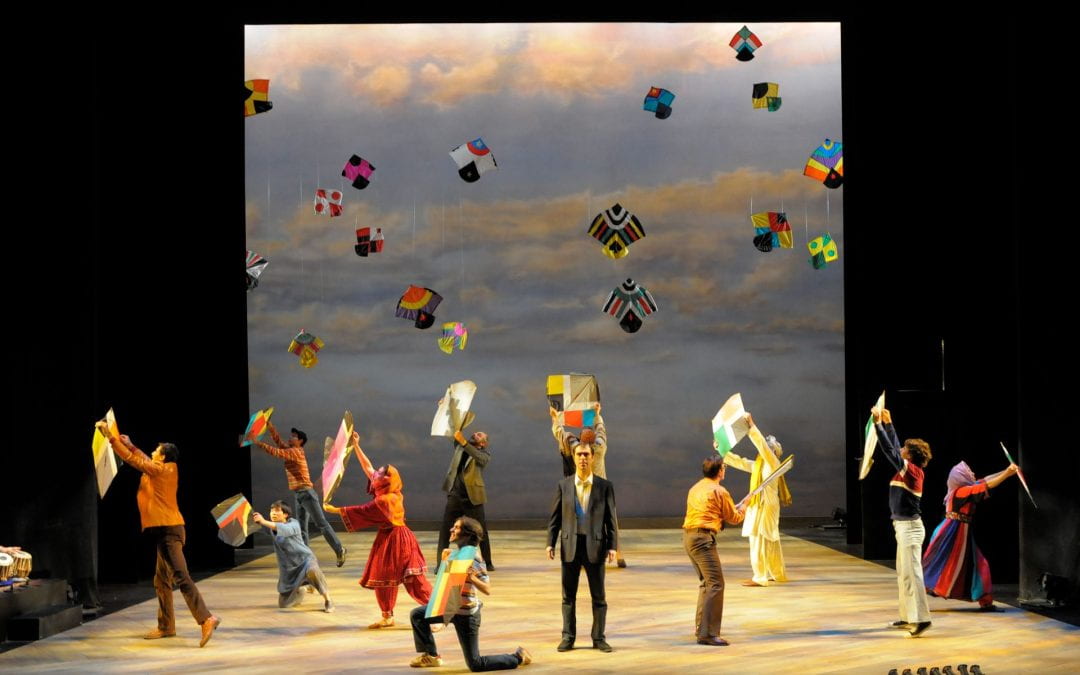
“The Kite Runner” Flies Again at the Hammer Theatre, 15 Years Later
